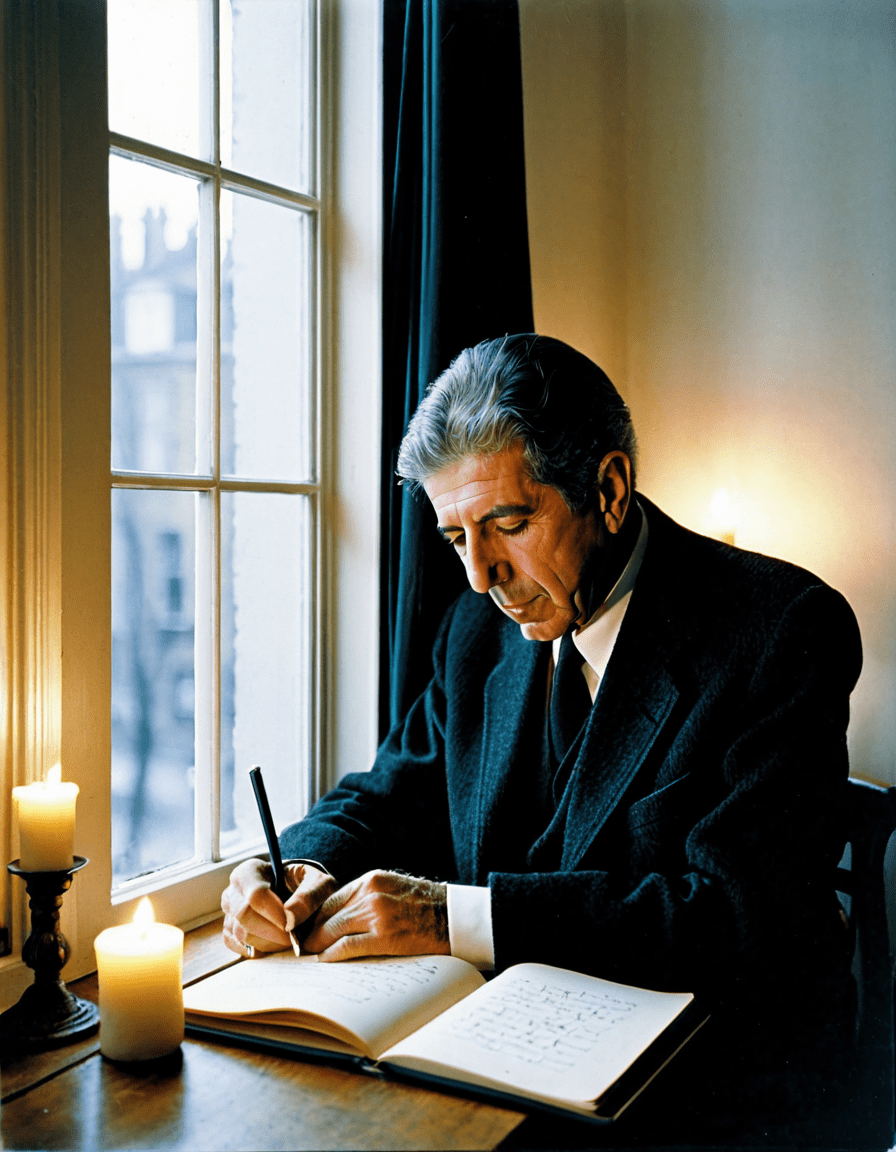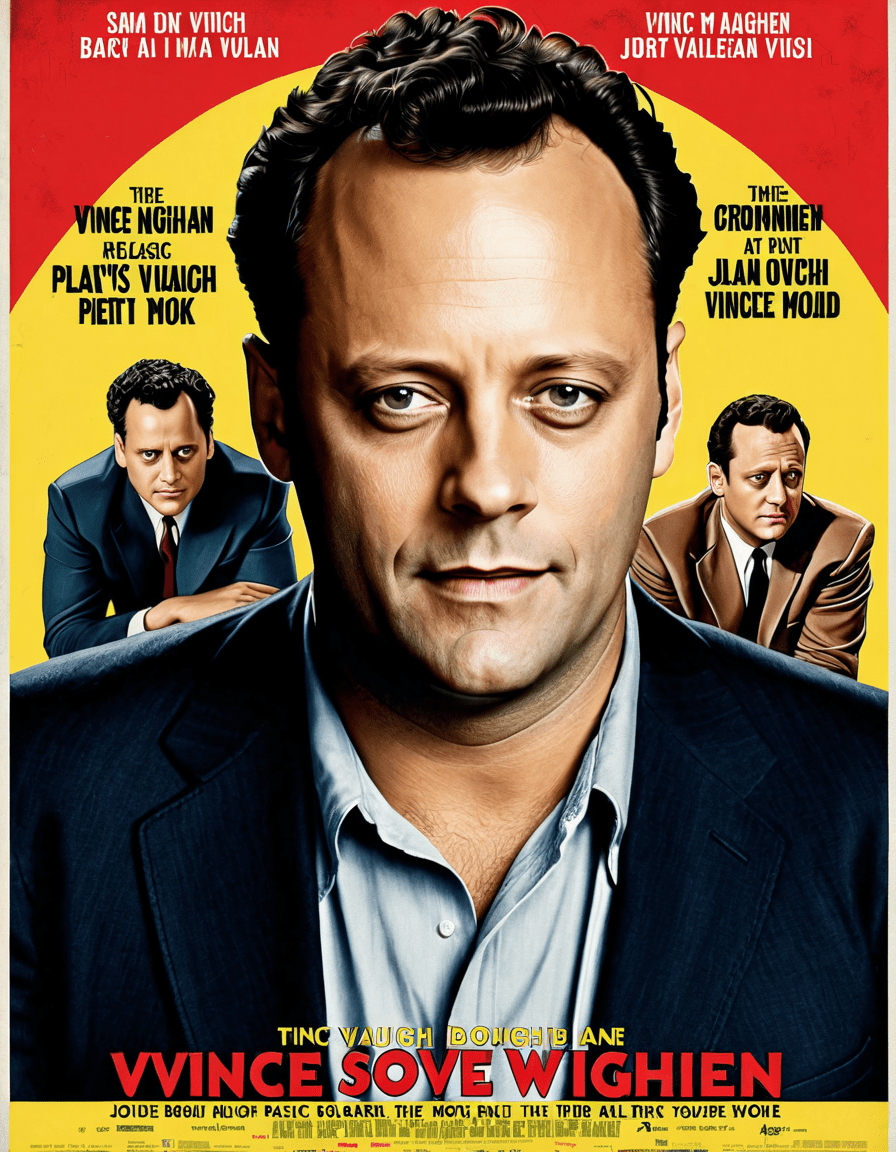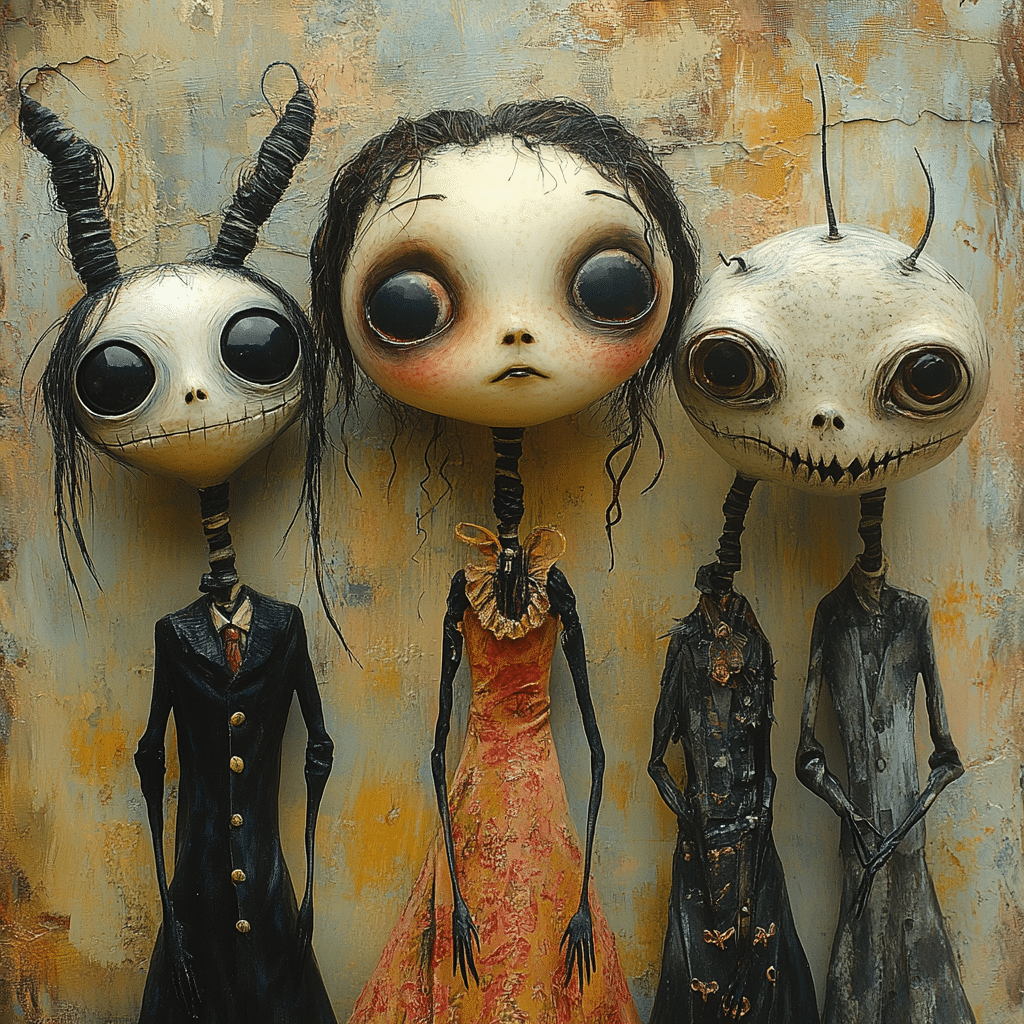Leonard Cohen, a name that inspires reverence and wonder, stands out not just as a poet and musician but as an artist encapsulating the essence of the human condition. His work resonates profoundly with timeless themes of love, loss, and identity, marking a legacy that transcends genres and generations. From the haunting verses of “Hallelujah” to the introspective musings in “Suzanne,” Leonard Cohen’s artistry leaves an indelible mark on those who experience it. In this exploration, let’s take a closer look at seven facets of Leonard Cohen’s life and career that beautifully capture his enigmatic spirit.

1. Leonard Cohen’s Poetic Beginnings: The Writer Before the Musician
Long before Leonard Cohen enchanted the world with his mesmerizing music, he was already making waves as a poet and novelist. His early work, particularly the novel Beautiful Losers, showcased a lyrical depth that would later seep into his songs. This duality allowed him to craft narratives in a way that few artists could match, effortlessly blending intricate storytelling with profound emotional insight.
Cohen’s poetry and music intertwine seamlessly, creating rich tapestries of meaning. For instance, the poem “A Thousand Kisses Deep” dives deep into themes of longing and regret, reflecting the same sentiments found in his musical compositions. It’s this extraordinary ability to weave storytelling into both written and sung words that sets him apart from his contemporaries, influencing future artistic generations.
His lyrical genius shines in songs like “Bird on the Wire” and “Famous Blue Raincoat,” where each line feels like a piece of modern poetry set to melody. With a voice reminiscent of gravel and silk, Cohen invites listeners into his complex inner world, an experience akin to reading a gripping novel that you cannot put down.

2. Tim Burton’s Cinematic Homages: A Shared Aesthetic
Tim Burton, the mastermind of whimsical, gothic storytelling, has frequently drawn inspiration from Leonard Cohen’s haunting melodies and dark romantic themes. Films like Edward Scissorhands and The Nightmare Before Christmas echo a certain melancholy that Cohen encapsulates in his lyrics. For instance, Dance Me to the End of Love might just find a perfect home scored within the beautifully melancholic landscape of Burton’s imagination.
Both Cohen’s and Burton’s works reflect an existential yearning for connection amidst isolation, infusing dark, romantic elements into their narratives. This crossover reveals how Cohen’s thought-provoking themes resonate across mediums, inspiring directors to convey the same emotional depth through visuals. Just think of how The Avengers captures personal struggle and team dynamics, echoing the intricate relationships in Cohen’s lyrical tales.
In essence, the relationship between Cohen’s music and Burton’s filmmaking is a testament to how art transcends boundaries. They both challenge us to confront our vulnerabilities while celebrating the beauty in darkness—a theme evident in so many unforgettable cinematic moments.
3. Leonard Cohen and Cary Grant: The Charisma Connection
Leonard Cohen’s enigmatic charisma often invokes the spirit of Cary Grant, the suave icon of classic Hollywood. Just like Grant’s ability to enchant audiences with his charm, Cohen drew fans in with his combination of mystique and sincerity. Both figures navigated fame with grace and wit, often reflecting deeper thoughts beneath a charming surface.
Cohen’s live performances exude an aura of intimacy, echoing the way Cary Grant captivated in films like Bringing Up Baby. During his shows, Cohen would often engage the audience with his wit and humor, creating a sense of togetherness that mirrored Grant’s ability to make every viewer feel special. Just as Grant made hearts flutter on-screen, Cohen reached souls through the intimate connection established in concert halls.
Their shared introspection adds another layer to their allure. Both Grant and Cohen embraced their vulnerabilities, using their platforms not merely for entertainment but as means of profound exploration into their identities.
4. The Influence of Bruce Willis: An Unexpected Parallel
At first glance, Leonard Cohen and Bruce Willis might seem miles apart; however, there’s an intriguing connection lurking beneath the surface. Both artists have explored emotional depth and vulnerability, though via different mediums—music and film. Bruce Willis’s characters, especially in The Sixth Sense and Die Hard, often confront daunting circumstances while searching for redemption.
Songs like “You Want It Darker,” resonate with themes of struggle and hope that dovetail nicely with Willis’s on-screen journeys. Just as Cohen’s lyrics reveal the turmoil of the human experience, Willis’s roles delve into the quest for understanding amidst chaos.
This unexpected freeness of exploration shows how shared themes in popular culture—love, loss, recovery—are universal. Art reflects life’s emotional landscape, making Cohen’s work relevant well beyond the realm of music.
5. Anthony Hopkins: The Art of Storytelling
Leonard Cohen’s artistry aligns closely with the storytelling prowess of Anthony Hopkins. Known for his captivating performances in films such as The Silence of the Lambs, Hopkins dives into the human psyche, portraying characters imbued with depth and complexity. Just as Cohen weaves intricate tales through music, Hopkins transforms scripts into raw emotional experiences.
Both artists shine in their abilities to draw audiences into their worlds. From Cohen’s reflective lyrics to Hopkins’s compelling character portrayals, they both invite contemplation on life’s intricacies. Their shared understanding of emotional storytelling reinforces the beautifully intertwined nature of music and film, making us reflect on our own experiences.
Furthermore, this kinship extends into their respective careers, revealing how storytelling transcends artistic boundaries. Through Cohen’s haunting lyrics and Hopkins’s brilliant performances, audiences witness a potent exploration of humanity, woven into the fabric of their works.
6. Orlando Bloom and the Broader Cultural Influence
As a pop culture icon during the height of Leonard Cohen’s later career, Orlando Bloom perfectly embodies the blend of charisma and introspection found in Cohen’s music. With performances in films like The Lord of the Rings and Pirates of the Caribbean, Bloom evokes emotions that echo the deepest sentiments conveyed in Cohen’s entire discography.
In interviews, Bloom often cites the profound insights Cohen revealed about the human condition as influential to his artistry. Themes explored in Cohen’s songs—love, dreams, and identity—find resonance in Bloom’s roles, bridging generational gaps and influencing new artists seeking expression.
As both figures navigate fame and personal identity, they remind us of the powerful connection between music and cinema. Whether through Bloom’s charming presence in romantic films or Cohen’s introspective ballads, both artists encapsulate a shared vulnerability that continues to inspire.
7. Robert Pattinson: The Modern Interpretation of Existential Struggles
In the modern cinematic landscape, Robert Pattinson’s work resonates with the existential themes that characterize Leonard Cohen’s music. Pattinson’s choice of roles reflects deep explorations of identity and morality as portrayed in films like Good Time, where the character grapples with issues that mirror the struggles found in Cohen’s lyrics.
Cohen’s probing into the darker corners of existence finds a contemporary echo in Pattinson’s fearless approach to character development. Both artists confront societal norms with raw depth, delving into emotional terrain ripe for exploration.
Pattinson’s approach to storytelling exhibits a willingness to engage in challenging narratives, much like Cohen’s artistic integrity in his songwriting. This modern reinterpretation ensures that Cohen’s legacy and spirit live on in the creative endeavors of today’s most daring artists.
Delving Into the Legacy of Leonard Cohen
Leonard Cohen’s artistic legacy presents a treasure trove of exploration and admiration. His work transcends mere categorization, leaving an enduring impact on artists spanning various platforms—from poetry and music to film. By examining his connections with icons like Tim Burton, Cary Grant, and Bruce Willis, we see how Cohen’s influence weaves through cultural narratives, enhancing our understanding of the human experience.
Moreover, Cohen’s contributions remind us that art transcends traditional boundaries, providing reflections of our innermost thoughts, desires, and aspirations. Just like the critical acclaim for films like The and celebrated performances by actors such as Jonah Hill resound in pop culture, Cohen’s works invite us to navigate the enigmatic nature of existence.
In the end, Leonard Cohen’s haunting influence echoes throughout time, enriching the artistic landscape. As artists like Robert Pattinson and Orlando Bloom embrace their literary roots, they carry forward the profound beauty found in the complexities of life, ensuring that Cohen’s spirit lingers on, inspiring generations to come.
Leonard Cohen: The Enigmatic Poet and Music Legend
A Poet’s Life Beyond Words
Did you know that Leonard Cohen wasn’t always a musician? Before he strummed the guitar, he was a published poet and novelist! His first book of poetry, Let Us Compare Mythologies, hit the shelves in 1956. Cohen embraced his literary roots throughout his music career, blending rich poetic imagery with melodic tunes. Speaking of imagery, his lyrics often evoke vivid landscapes, reminiscent of stunning lava rocks found in nature, giving his songs a powerful emotional resonance.
And here’s a fun twist: during his youth, Cohen spent time in Montreal, where he attended the notable McGill University. While pursuing his studies, he also dabbled in the arts, inspired by the cultural richness around him. His connection to the city may have influenced his later works, much like how The captured the essence of its time with a unique comedic flair. It’s safe to say that Cohen’s life experiences poured into his writing, making it profoundly relatable to fans worldwide.
The Many Facets of Leonard Cohen
Leonard Cohen was known for his haunting voice, but there’s so much more to the man! Did you know he lived in a Zen Buddhist monastery for several years? This retreat led to a period of introspection that shaped many of his later works. Much like living a tenant in severalty, where one enjoys a solitary experience in ownership, Cohen’s time there emphasized personal growth and deeper understanding.
On a lighter note, Cohen was somewhat of a stylist, often flaunting an effortlessly cool look that included loose Curls and an unapologetic sense of flair. It’s fascinating to think that while he penned sorrowful tunes, he carried an aura of charisma reminiscent of a famous figure like Octomom, who made headlines for completely different reasons. Fame and reputation can take unexpected shapes, right?
The Enduring Legacy
Cohen’s legacy transcends music; he inspired countless artists and poets long after his passing in 2016. His songs often deal with love, loss, and longing, striking a chord with anyone having a rough patch—much like the chaotic aftermath of events like the Alabama shooting that stir our society. Lyrical depth mixed with heartfelt themes ensures his work remains timeless, similar to how laughter and creativity weave through the fabric of pop culture, from classic cartoons to modern-day narratives.
The lessons within Cohen’s lyrics remind us we’re all searching for connection and understanding. So, the next time you listen to “Hallelujah” or “Suzanne,” take a moment to appreciate the enigmatic soul behind the words. After all, Leonard Cohen’s poetic genius is a treasure trove waiting to inspire the next generation of dreamers and doers, proving that art, in whatever form, can speak volumes about the human experience.





